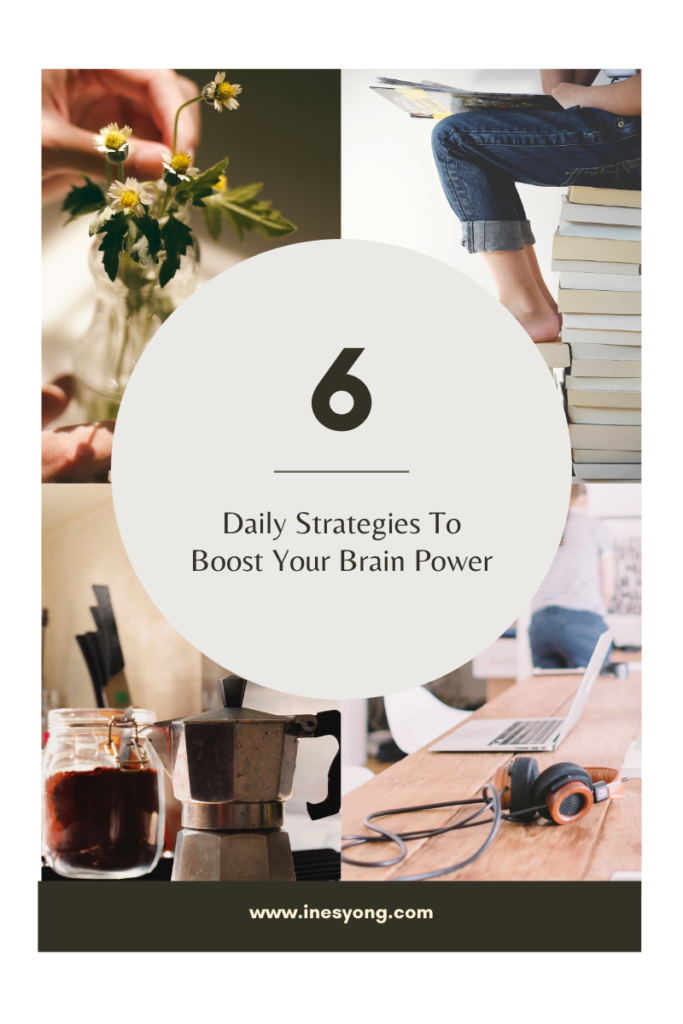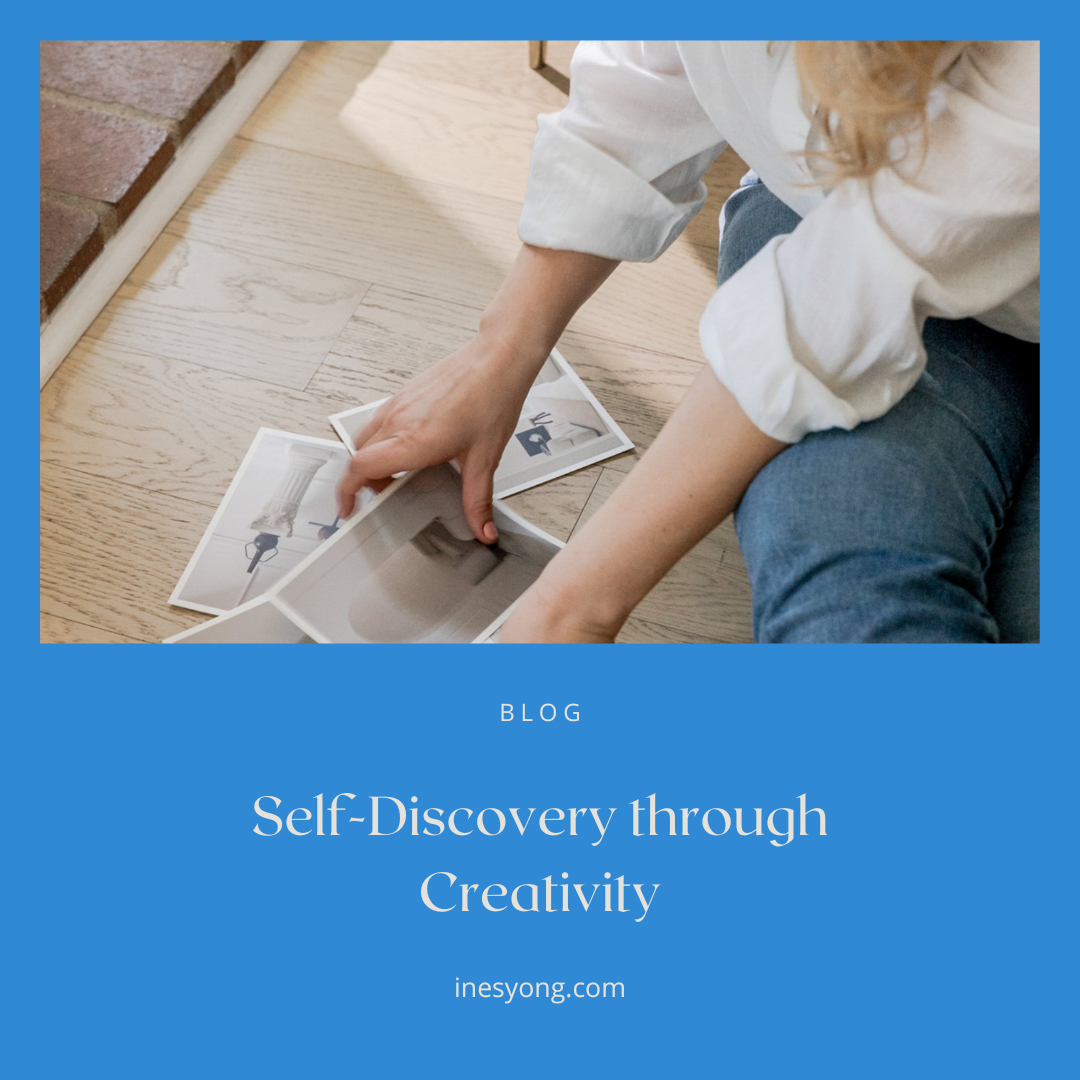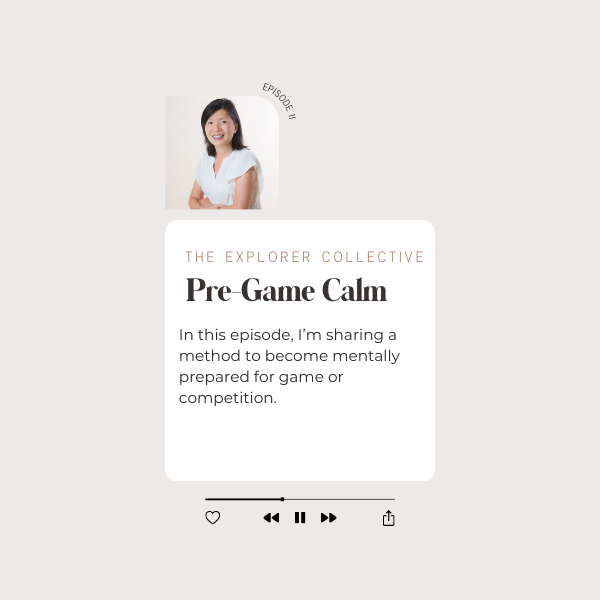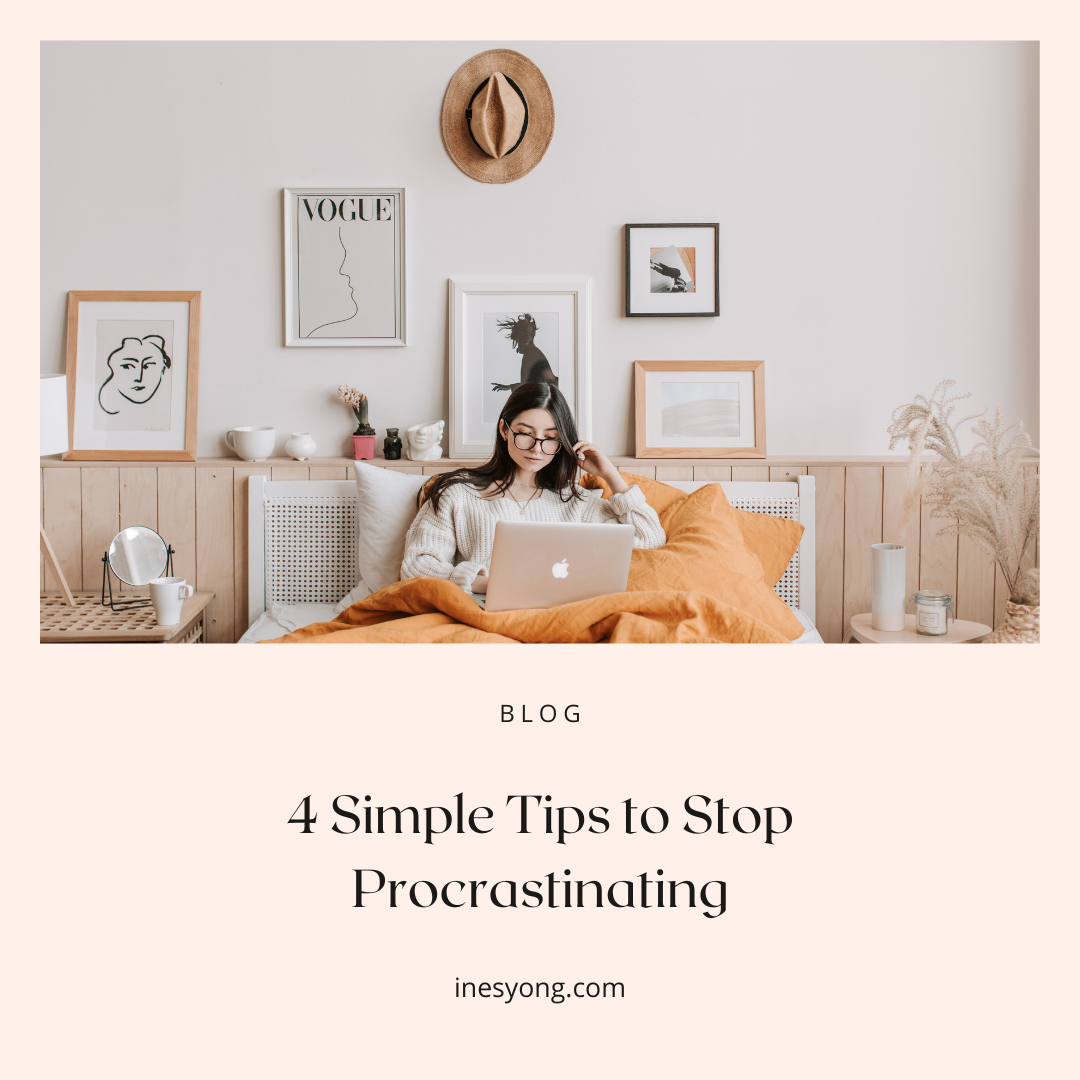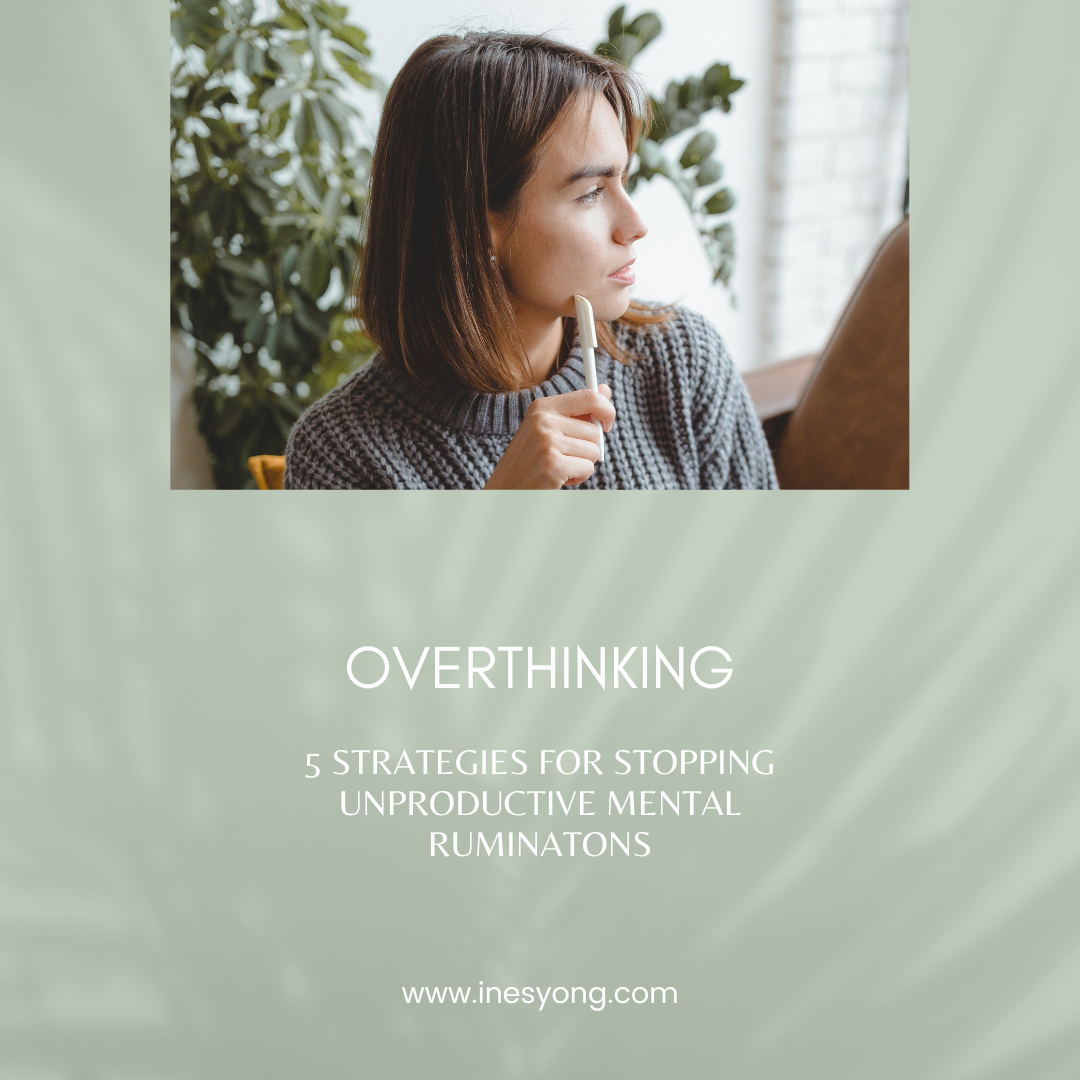Are you having difficulty remembering information or experiences? Are you worried about your brain deteriorating as you age? Do you already find that your memory isn’t as good as it as it used to be? Are you looking to boost your brain power?
Then, you have come to the right place. This post provides you with guidance towards having a healthier brain and a vital memory. By simply applying the practical and highly effective methods of memory improvement tactics, you will finally be on your way to becoming the ultimate version of yourself. Each brain is different, but the cognitive processes are the same. You may have irregular sleep patterns, extreme stress, lack of brain workout, and an unhealthy diet, that have done harm to your memory.
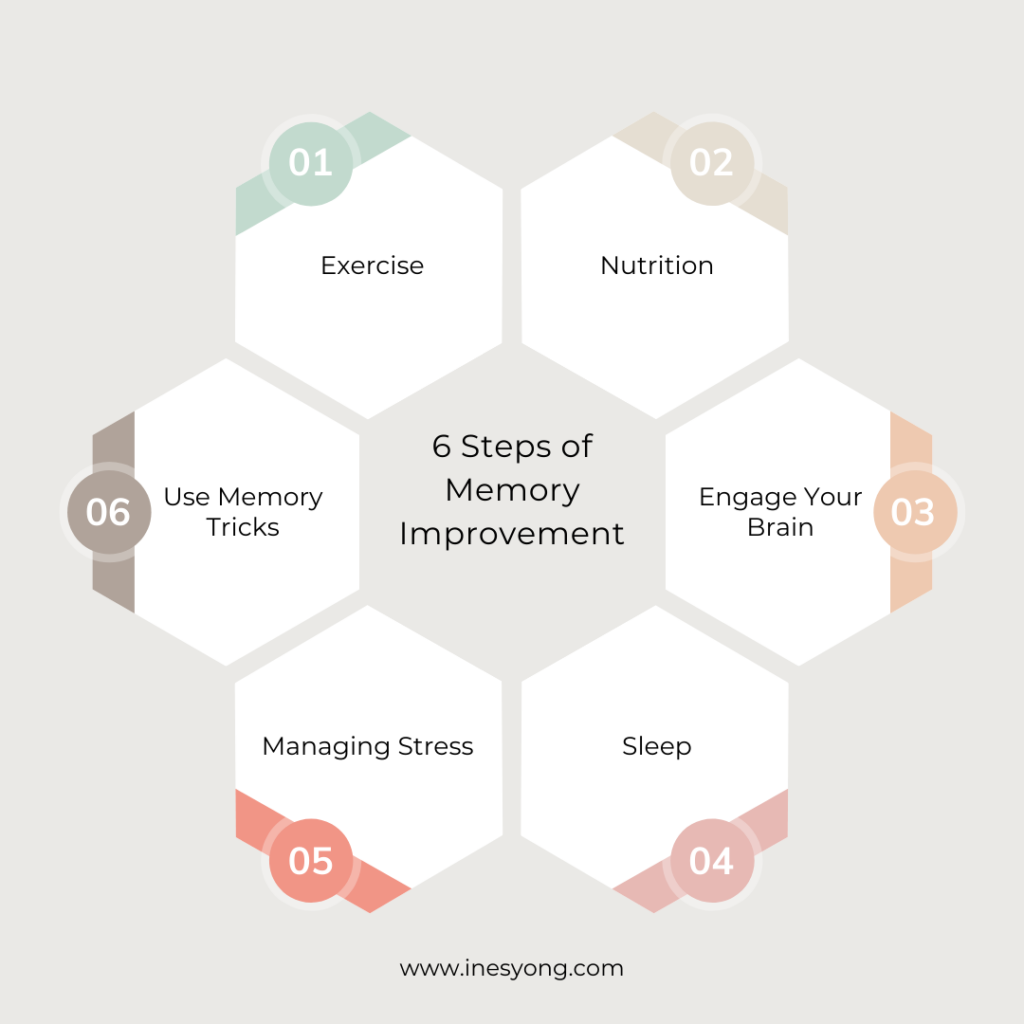
#1 : Exercise
If you are not a physically active person, then you can start with brisk walking, jogging, swimming, cycling, or dancing. Try various simple, yet effective ways to increase your physical activity, such as parking your car away from your destination, walk the distance and taking the stairs instead of the elevator. Also, during exercise, the production of happy hormones such as endorphins accelerates. You will feel great, both physically and mentally.
Exercise is good for your physical, and mental health, it alleviates depression and improves memory:
- Exercise regulates brain chemicals such as neurotransmitters and promotes the growth of new brain cells.
- Increases feeling of confidence, self-esteem, sense of mastery, and competence.
- Have a helpful effect on your mood and sense of well-being
- Releases feel-good hormone known as endorphins
- Increases the quality of sleep. Having a quality sleep subdue mood disorder
- Helps to overcome your sedentary and inertia lifestyle that sometimes leads to depression
- Improves your social contacts – exercise classes or health club
- Builds physical endurance and strength, which lowers fatigue
- Helps you maintain weight
Physical Activity Guidelines recommended by the U.S. Department of Health and Human Services
- Moderate endurance or aerobic exercise – at least 2.5 hours (150 minutes) weekly or vigorous-intensity activity for 75 minutes weekly.
- Aerobic exercise throughout the week, at least 10 minutes at a time.
- Moderate-intensity muscle-strengthening exercise for all main muscle groups – at least 2 days weekly.
- If you cannot follow the guidelines, then remain as active as possible.
Here are examples of 150 minutes of moderate-intensity aerobic exercise
- Moderate intensity 10-minute walk, three times daily – 5 days a week.
- Moderate intensity 20-minute bike ride, 3 days weekly. And a 30-minute walk – 3 days weekly.
- Moderate intensity 30-minute aerobic dance class, twice a week, and three 10-minute walks – three days weekly.
- Gardening and yard work (lifting, raking, digging) 30 minutes a day – at least 5 days a week.
Examples of muscle-strengthening exercise
- Do ten exercises 8-12 times each twice a week
- Lift weights, bend, or just work against your own bodyweight to do exercises for your arms, trunk, and legs.
- Do yoga – twice weekly.
Start your exercise routine slowly and gradually increase the time. For example, start with 10 minutes of walking every day and gradually increase the time.
HIIT
As you get used to exercising, do HIIT or high-intensity interval training, because HIIT is a guaranteed fat burner. Various studies show that HIIT burns fat faster than regular aerobic exercise. Incorporate HIIT into your exercise routine. For example:
Jog at a 10-minute mile pace, then make a 30-second sprint after every 5 minutes of jogging.
- HIIT: Here is a usual HIIT exercise plan with an elliptical machine:
- Warm-up your body for 2 to 3 minutes.
- Exercise hard and fast for 30 seconds. Exercise should make you feel out of breath and unable to practice a few seconds more. Use lower resistance and higher repetitions to increase your heart rate gradually.
- Recuperate for 1 ½ minute. Continue to move your body, but at a much slower pace and lower resistance.
- Repeat the HIIT and recovery several times.
Initially, you may only be able to do 2 or 3 repetitions of HIIT. Gradually increase your time and aim for a 20-minute session once your body gets fitter.
Choose a Fun Activity
Exercising involves stretching, pulling, sweating, and after a hard day’s work, not all of us are looking forward to exercising. If you find exercising or going to the gym a routine chore, then try activities that are fun for you. According to health experts, “the best exercises are activities and sports that you enjoy doing.” Choosing sport instead of a workout is an enjoyable way to stay fit and healthy. Open your mind to different possibilities – kiting, skiing, triathlons, surfing, swimming in the ocean, etc. The following are some activities and sports that you will enjoy doing:
- Tennis: Playing tennis will help you burn more calories and increase agility in the process.
- Kickball: This simple and friendly game will help you burn more calories than you think.
- Racquetball: Casual game of racquetball will make you fitter and boost memory
- Soccer: Play hard to burn calories, lose weight, and stay fit.
- Rowing: Moderate pace rowing offers you low-impact, full-body enjoyable workout.
- Ultimate Frisbee: The game involves a lot of running; it helps you stay fit and mentally healthy.
- Beach volleyball: This casual game under the hot sun will help burn calories, keep you in shape, and boost memory
#2 : Nutrition
Countless studies have proven that nutrition have significant impact on brain power. One of the books I recommend reading on this topic is Brain Food : How to Eat Smart and Sharpen Your Mind by Lisa Mosconi who uses cutting-edge research to highlight the connection between nutrition and our brain’s health, busting through pseudoscience and demonstrating how we can all change our diet most effectively.
The Mediterranean Diet
General guidelines of the Mediterranean diet are collected in the Mediterranean Diet Pyramid. It is accepted to be the “gold standard” dietary plan that boosts your health. The pyramid was created in 1993 and made the Mediterranean diet popular. The pyramid was developed by Oldways Preservation and Exchange Trust and Harvard School of Public Health. It reflects the social and cultural traditions of the Mediterranean lifestyle.

Mediterranean Diet Pyramid
Whole grains, vegetables, and fruits: They are an integral part of the Mediterranean diet plan. The grains you should add to your diet should be non-refined whole grains, such as quinoa and brown rice. Vegetables can include green leafy vegetables such as kale, spinach, broccoli, Brussels sprouts, cauliflower, and carrots.
Olive oil: Olive oil is a very important part of the Mediterranean diet and much healthier – compared to other vegetable oils such as canola oil or sunflower oil. Use olive oil with every dish and replace butter and margarine with olive oil. Consume an average of ½ cup per week.
Beans, nuts, and seeds: Beans, nuts, seeds, and lentils are a great source of protein. Use these ingredients and substitute them with red meat where possible. They are a more filling, more affordable, and healthier source of protein compared to red meats.
Spices: Use herbs and spices to flavor food instead of sodium-rich table salt. Get creative when flavoring food by combining fresh herbs with olive oil to marinate your food. Season dishes with fresh cracked black pepper for extra spiciness.
Fish and seafood: The omega-3 oils found in fish are required for healthy brain development, and it helps reduce the risk of cardiovascular disease when consumed regularly.
Poultry, eggs, cheese, and yoghurt: Include poultry, eggs, cheese, and yoghurt in your daily diet. Always focus on moderate consumption of any dairy products and monitor the effects they have on you.
Meats: Red meat should be kept to a minimum, as it is not the healthiest diet option and can be substituted with legumes, beans, and seeds. When you eat red meat, try to eat grass-fed, organic red meat and keep it to a minimum amount of servings per week.
Red wine: Many studies have shown that one glass of red wine per day can have multiple beneficial aspects for your health. It is recommended on the Mediterranean diet to enjoy one glass of red wine. Remember, more than two glasses can be detrimental to your health.
Physical activity and social interaction: The Mediterranean lifestyle includes moderate amounts of daily physical activity and social interaction. Mediterranean’s walk or cycle to work and lead very active lifestyles. Meals are also enjoyed as a family and are eaten over a longer period of time, with plenty of conversation and laughs in between. If you cannot walk or cycle to work, try to take short walks when home and do as much physical activity during your normal day, such as taking the stairs instead of the elevator. Sit down at breakfast, lunch, and dinner and take time to savor your food. Try to taste every bite and identify the ingredients in each bite. Use dinnertime to talk to your family and discuss everyone’s day, some goals for the week, your hobbies, and anything interesting you may have seen or heard that day.
The principles of the Mediterranean diet
The principles of the Mediterranean diet are simple and easy to follow. You will be pleased to discover that the Mediterranean diet is more about what you can and should eat than what you shouldn’t eat.
Eat a plant-centered diet: Build your meals around vegetables, fresh fruits, beans, and legumes. These whole foods are central to the health benefits of the Mediterranean diet. They provide energy in the form of complex carbohydrates, antioxidants, vitamins, minerals, phytochemicals, and fibre. These nutrient-dense foods fill you up and keep you satisfied, thus helping to control your weight while providing disease-fighting nutrients.
Chose whole grains: Avoid refined grains, like white flour and rice. Choose whole grains, such as whole wheat, brown rice, oats, barley, corn, quinoa, farro, bulgur, millet, and so on, including whole-grain bread and pasta. Whole grains are higher in nutrients, including minerals, vitamins, and fibre.
Eat foods that contain healthy fats, including olives, olive oil, nuts, and seeds: Olive and olive oil are rich in heart-healthy monounsaturated fats and antioxidants. Add olive to your pasta, salads, stews, and have them as a snack. Nuts and seeds such as almonds, cashews, pine nuts, hazelnuts, pistachios, pumpkin seeds, sesame seeds, and walnuts are also good sources of healthy fats. Avoid fats that are higher in saturated fats, such as butter, cream, lard, or red meat. Completely avoid trans fats such as hydrogenated oils and margarine.
Eat fish and seafood: Eat fish and seafood such as tuna, crab, squid, shrimp, sea bass, sardines, salmon, octopus, mussels, herring, cod, clams, bream, and anchovies.
Moderation is the key: It is important to keep portion sizes in check when consuming high calorie and high saturated fat foods like cheese, red meat, refined grains, and foods sweetened with refined sugar.
Take time to enjoy life and be physically active: The Mediterranean way of life is more relaxed than the typical American lifestyle. People in this coastal region take ample time to enjoy meals with their families. They walk or bike to work, instead of driving. They take far more vacation time. And all of these things reduce stress and contribute to good health.
On the Mediterranean diet, you need to consume:
- At least 4 servings of fresh fruits and vegetables per day
- 3 to 5 servings of whole grains per day
- 4 to 6 servings of healthy fats per day
- At least 3 servings of fish and seafood per week
- Up to 7 servings of dairy products per week
- Up to a 5-ounce glass per day for women, two glasses per day for men
- 3 to 5 servings (2 eggs) per week
- 2 to 5 serving of poultry per week
- Up to 4 servings of sweets per week
- 3 to 5 servings of red meat per month
#3: Engage Your Brain
Here are some useful memory tricks and activities to boost memory:
Play Brain Games
Playing various brain games will certainly improve your memory. You can start with the old fashion way by playing crossword puzzles and Sudoku. These games and puzzles creatively challenge your brain. These games involve complex mental tasks such as mathematics, logical reasoning, pattern recognition, and nonlinear thinking. However, continuing to play the same game daily will not be helpful. Because your brain will get familiar with the pattern, and the puzzles will become less productive. Mix things up slightly, play puzzles and Sudoku on different days. The following are some popular brain game apps for you.
- Lumosity: This popular memory development app is split into three sessions of three different games, personalized for your goals – problem solving, memory, attention, and flexibility of thinking.
- Personal Zen: This game is developed by the City University of New York. It reduces anxiety, trains your brain to focus on positive matters, and avoid the negative side of things. Like – the silver lining in a bad situation.
- CogniFit Brain Fitness: This app is designed by neuroscientists to provide sleek, fun games, and improves cognitive abilities such as concentration and memory.
- Happify: Studies show that focusing on happy memories helps you remember information quickly. The app makes your brain happier and boosts brainpower.
Crossword and Sudoku
One of the popular and exciting methods to improve brain power is to play and solve crossword puzzles and Sudoku. These puzzles and games creatively challenge your brain. These games involve complex mental tasks such as logical reasoning, mathematics, nonlinear thinking, and pattern recognition. A word of caution, playing crossword puzzles continually will not be helpful as the brain will get used to the pattern. Try playing Sudoku and puzzles every other day. Sudoku is an exciting game, and you can play it online as well.
Visualisation
Visualization is an excellent mental exercise for memory improvement. For a few minutes daily, visualize things and events from your past. Visualizing will make you relaxed and, at the same time, stimulate your brain. When remembering past events, try to involve as many senses as possible in your visualization process. Including all your five senses will create a more vivid visualization. Visualization can sharpen your brainpower. In this method, you are taking advantage of your underutilized visual potential. Visualization is an easy exercise for you and takes only a few minutes.
Take Notes Creatively
When taking notes, avoid traditional methods and do it creatively. Use drawings, diagrams, color, numbered lists, and use one word per line. Add different colors and sketches to your text when taking notes. This technique will engage a large part of your brain and make it easier for you to remember new information. Usage of colors and graphics will engage your visual skills more, and your brain has to think about the information very closely. Creative note-taking will reduce the burden on your working memory and make it easier to remember things.
Learn a New Language
Learning a new or a second language will make your brain’s executive function stronger. A brain with strong executive function can focus on matters more closely. Start to learn a new language and practice regularly. It will automatically ensure that you use your executive control system more, and with more practice and usage, you will boost your brain power. Furthermore, learning a new language involves familiarity with different vocabulary and new memorization rules – which improves the overall memory capacity of your brain. Studies show that a person who speaks multiple languages is better at remembering directions, sequences, names, or shopping lists. Their brain can easily separate relevant information and nullify irrelevant ones.
Read More
A habit of reading more will help you to remember information better. For your brain, reading is a much harder neurological challenge than watching a TV show or a movie. A single sentence contains a lot of information for your brain to process. When you read, you give your brain more time to think – you read the book, understand the meaning of the sentence, and then move on to the next sentence. But when you are watching a TV show or a movie, things are moving too fast, and your brain gets less time to think. A UK study found that a person who reads regularly showed a lower rate of decline in memory. With habitual reading, your brain becomes familiar with words, and you recall them easily. When reading a newspaper, do not limit yourself to a certain section, read a variety of sections like business news, sports news, editorial, and even gossip section.
Chew Gum to Improve Memory
Numerous studies have shown that chewing gum helps a person to learn new information quickly. According to researchers, chewing gum improves your working and long-term memory. Japanese scientists noticed that when a person chews gum, activity in the hippocampus part of the brain increases. Another study suggests that gum chewing sends a signal to the brain of impending food, and the brain releases insulin, which triggers activities in the hippocampus. There is also a third explanation circulating in the scientific world – a few scientists suggest when a person chews gum, it supplies more oxygen to the brain, and it becomes more active.
Therapy
A depressed person suffers from mild to severe memory loss. Therapy is a practical technique to treat a depressed person and bring back his ability to learn and remember new information. Suffering from depression, the person considers a minor setback in life as a major incident and focuses only on the negative side. Continuously thinking negatively for a long time will take a toll on a person’s ability to remember information.
Challenge Your Brain
Challenge your brain, and keep your brain busy. A busy brain is always a healthy brain. Teach your brain to perform different things. For instance, try to write or throw a ball with your non-dominant hand. Why playing a game, use your wrong foot for most of the activity. Initially, it will be uncomfortable, but with regular practice, your brain will learn to do different activities differently, and you will learn new information quickly.
Teach your brain to solve complications
You can play chess or scrabble; games like these help you to focus. When planning a trip for the vacation, do extensive research, and try to remember as much information as possible. This will train your brain to remember past experiences and remember things better.
Drink sufficient amount of water
The human brain is 80% water, and it needs a steady supply of water (not beer, juice, or coffee) to keep it hydrated. If your brain is dehydrated, it cannot function properly, and remembering information becomes a struggle for you. A study by Ohio University found that individuals who are properly hydrated with water scored better in several memory tests.
Cultivate Positive Attitude
Having a positive attitude helps you immensely. If you are a middle-aged person, then it might be difficult for you to start reading books or start learning a new language, but with a positive attitude, things become much easier.
#4: Sleep
A good night’s sleep gives your body time to rest, recharge, and makes you feel better. A good night’s sleep also gives your brain the ability to learn and remember new information. Your body rests when you sleep, but your brain continues to work. It processes new information from the day and creates memories. If you keep depriving yourself of good sleep, your ability to learn and recall new information is severely impaired, and your risk of developing serious health problems such as obesity, hypertension, and diabetes increases drastically.
Sleep to learn.
Individuals who want to improve memory may find these tips useful:
- If you have to learn some complex equations or information, get a good night’s sleep before learning, because, the lack of sleep can lower your learning ability to 40%.
- Once you have learned new information, get a full night of sleep within 24 hours of acquiring the information. This will help to strengthen new memories and connect different pieces of information.
- New memories won’t be strengthened with brief periods of sleep (4 hours or less).
- A 1 ½ hour nap can help strengthen memories, but taking naps late in the day can make it harder for you to sleep at night.
Tips for better sleep
- Maintain a fixed bedtime: Fix a bedtime and maintain it regularly – even on weekends. Go to bed when you normally feel tired and sleepy and go to bed at the same time daily. If you have to adjust your bedtime, make small changes like going to bed 10 or 20 minutes early or late.
- Wake-up at the same time daily: Usually, if you sleep comfortably for about 7 to 8 hours, you should wake up normally at the same time every day without needing an alarm. If you need an alarm to wake up in the morning, it basically means that you don’t get enough sleep at night.
- Nap during the day: Occasionally, if you are unable to get enough sleep at night, take a nap during the day to make up for it rather than breaking your sleep routine. Avoid naps if you have insomnia.
- Don’t sleep before your bedtime: Some days, you may feel sleepy after dinner. Avoid going to bed and do a mildly stimulating activity such as walking or washing the dishes and avoid sleeping.
- Turn off your Computer and TV before bed: Don’t play stimulating games or watch violent TV shows before bedtime. These stimulating activities delay the sleeping process. Listen to soft music or read a book instead.
- Use an e-reader and don’t use backlit devices such as iPad for reading.
- Keep your bedroom dark and cool, ideally around 18 C.
- Use a comfortable bed or bed mattress
- Use your bed only for sleep and sex
Things you should avoid before sleep
- Don’t eat a heavy dinner just before bedtime. This will inhibit digestion and make you feel sick afterward.
- Avoid drinking alcohol before sleep. Alcohol before bedtime leads to shallow sleep.
- Avoid caffeine and smoking before bedtime, and don’t take sleeping pills.
What is enough sleep?
The amount of sleep necessary for a person depends partly on age. Sleep time varies from infancy, through childhood to an older age. Generally, the average amount of sleep required by healthy adults is 7 to 8 hours every night. “Enough sleep” is the amount that makes you feel mentally and physically rested, sharp, not irritable, and able to focus, concentrate, and correctly do basic motor tasks.
Keeping a sleep diary is really important – to understand your sleep patterns. A sleep diary is a detailed chart where you record:
- Your bedtime
- How long it takes you to fall asleep.
- The number of times you wake up during sleep
- How long you stayed awake
- The exact time you are finally awake and out of bed in the morning.
#5: Managing Stress
Prolong period of stress can diminish your memory severely.
What is stress?
Everyday experiences that are physiologically and/or emotionally challenging – produce the stage you know as stress. Occasional stress is not a bad thing, but chronic stress or stress for a prolonged period can damage your body and has a serious negative effect on your health, including memory. These days, stress is one of the major causes of memory problems in healthy adults.
How chronic stress affects memory?
Chronic stress affects your brain, both memory saving, and remembering capacity. When your brain is overwhelmed with stress hormones for a long time, you start to lose memory, and your ability to learn and store new information decreases. Especially, a high level of the stress hormone, cortisol, can be very destructive. But you don’t have to worry because, if you can manage stress effectively, both your storing and remembering brain function goes back to its previous state.
Manage stress and improve your memory
You can start to make a few small changes to your daily life that can help you lower the effect of stress on your body and mind. Here are some tips for managing your stress.
Whenever you are feeling stressed, try any of these:
| Daydream for 10 minutes. | Read affirmations loudly |
| Laugh | Sing a song |
| Listen to your favorite music | Play a relaxation CD |
| Listen to some soothing sound, like rainfall | Light a scented candle |
| Drink a cup of tea | Burn some aromatic oil |
| Do some baking | Eat a piece of dark chocolate |
| Chew sugarless gum | Wear soft, warm clothing |
| Squeeze a stress ball | Have a massage |
| Do some yoga | Stroke a pet |
| Read a good book | Walk in the park or spend time in nature |
| Do some exercise | Talk with a friend |
| Watch a favorite film | Look at memory or storyboard |
| Paint or take some photos | Listen to a radio program and keep the eyes closed |
#6: Use Memory Tricks
Here are some memory techniques that will help you boost your memory.
Linking and association
Linking and association is a method that helps us recall effectively by crafting stories using the items we want to remember in chronological order. With practice, you will know that it is possible to link and associate any piece of information with another.
How it works
For example, imagine that you need to remember 5 items. The linking process would look like the following :
Subject <Item 1>Item 2>Item 3>Item4>Item5
The first point is linked to the original subject and to the second item. Each point leads to the next in a sequence.
How to use
Remembering a list of words:
- Shoes
- Milk
- Postman
- Horse
- Blue
Picture your shoes smelling copious. You choose to take them off, and as soon as you do it, milk starts to dispense! The milk splatters everywhere and also into the eye of the postman. The postman gets agitated and jumps on his horse and starts to come after you. You flee and feel you are getting sick, and you suddenly turn blue!
Example of a To-do list
- Take the rubbish bin out
- Buy the newspaper.
- Pick up dry cleaning.
- Work out at the gym.
- Water the plants.
You were coming to the house, and suddenly the rubbish bin flips over and tips itself on top of you. The rubbish is full of dirty newspapers. You retch your head over to the dry cleaners to change into clean clothes. After the change of clothes, you feel pumped and refreshed, so you wish to workout at the gym. You accidentally drink too much water during your workout, so you need to pee. The lavatories are unusable, so you end up watering the plants.
With linking and association, the word you are memorizing does not have to be exactly the same as how you memorize it. It might be different. You must try as long as it takes – to read the paragraph and connect with the listed words, about 1 minute.
Number rhyme
In this method, the numbers go with the words.
How the method works
- one = gun
- two = shoe
- three = tree
- four = door
- five = hive
- six = sticks
- seven = heaven
- eight = gate
- nine = wine
- ten = pen
How to use
For example, we want to recall the words on the right of the rhythm method. We associate the rhyming list with the words to be recall list.
- Gun: elephant
2. Shoe: breakfast
3. Tree: CD
4. Door: computer
5. Hive: TV remote
6. Sticks: water
7. Heaven: towel
8. Gate: chocolate
9. Wine: tomato
10. Pen: phone
Now, let’s get creative!
- The hunter shoots the elephant with a gun.
- You have breakfast using your shoe as a spoon.
- The tree outside is growing peaches.
- The door opens, and you see a supercomputer.
- There is a beehive in your TV remote.
- You chuck sticks into the water because you have nothing to do.
- As soon as you enter paradise, you are offered a clean towel
- The gate is created with chocolate, and you have to chew your way through to the center.
- You stuffed a tomato in a wine bottle.
- You created happy faces with your pen on a stranger’s cellphone
Let’s recall.
Gun …………………….
2. Shoe …………………….
3. Tree …………………….
4. Door …………………….
5. Hive …………………….
6. Sticks ……………………
7. Heaven …………………….
8. Gate …………………….
9. Wine …………………….
10. Pen …………………….
You should finish the entire exercise within 2 minutes.
Consistency and lifestyle change keeps your brain healthy
People often face memory problems as they age. Additionally, an unhealthy lifestyle such as living a stressful life, irregular sleeping patterns, and poor diet can contribute to memory loss. Just like other muscles, your brain requires exercises to stay fit. Once you have started to apply these tips and strategies in your life, you will begin to notice improvements in your ability to remember things vividly.
